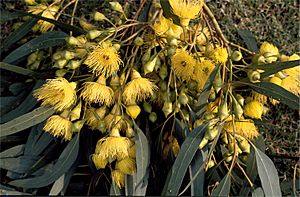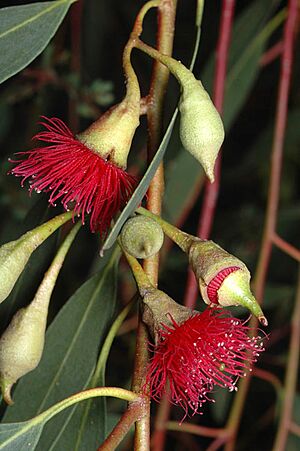Eyre Peninsula blue gum facts for kids
Quick facts for kids Eyre Peninsula blue gum |
|
|---|---|
 |
|
| flower buds and yellow flowers of Eucalyptus petiolaris | |
| Scientific classification | |
| Genus: |
Eucalyptus
|
| Species: |
petiolaris
|
| Synonyms | |
|
Eucalyptus leucoxylon subsp. petiolaris Boland |
|
The Eucalyptus petiolaris, often called Eyre Peninsula blue gum, water gum, or just blue gum, is a type of tree. It is a small to medium-sized tree. It grows naturally only in South Australia.
You can also find it growing in some parts of Western Australia. This tree has rough, flaky bark on its trunk. Higher up, the bark is smooth and greyish. Its leaves are shaped like a spear. The flowers can be cream, yellow, pink, or bright red. They grow in groups of three. The fruit looks like a cup or a barrel.
Contents
What the Eyre Peninsula Blue Gum Looks Like
The Eyre Peninsula blue gum usually grows to be about 15–20 m (49–66 ft) tall. This is like a five-story building! It has a special woody swelling at its base called a lignotuber. This helps the tree regrow if it gets damaged.
Its bark is rough and flaky on the lower part of the trunk. Higher up, the bark is smooth and can be greyish or yellowish. Young plants have dull grey-green leaves. These leaves are egg-shaped. They are about 60–90 mm (2.4–3.5 in) long and 38–68 mm (1.5–2.7 in) wide.
Adult leaves are the same green color on both sides. They are shaped like a spear or slightly curved. These leaves are about 85–150 mm (3.3–5.9 in) long and 12–25 mm (0.47–0.98 in) wide. They narrow down to a stalk called a petiole, which is about 12–27 mm (0.47–1.06 in) long.
Flowers and Fruit
The flower buds grow in groups of three. They hang down from a stalk called a peduncle, which is about 9–22 mm (0.35–0.87 in) long. Each bud has its own small stalk, called a pedicel, about 6–17 mm (0.24–0.67 in) long.
Mature buds are oval or cylinder-shaped. They are about 11–17 mm (0.43–0.67 in) long and 7–10 mm (0.28–0.39 in) wide. They have a cap-like top called an operculum. This cap can be cone-shaped or slightly beaked.
The trees flower from August to January. Their flowers can be cream, yellow, pink, or even bright red! After flowering, the tree produces woody fruit. This fruit is a capsule that looks like a cup or a barrel. It is about 11–17 mm (0.43–0.67 in) long and 10–15 mm (0.39–0.59 in) wide.
How it Got its Name
The Eyre Peninsula blue gum was first described in 1979. A scientist named Douglas John Boland gave it the name Eucalyptus leucoxylon subsp. petiolaris. He wrote about it in a science journal called Australian Forest Research. He had collected samples of the tree near Pillaworta Creek in 1971.
Later, in 1992, another scientist named Kevin James Rule decided it was different enough to be its own species. So, he changed its name to E. petiolaris. The word petiolaris comes from Latin. It means "having a petiole," which refers to the stalk of the leaf.
Where the Eyre Peninsula Blue Gum Lives
The Eucalyptus petiolaris mostly grows in South Australia. You can find it in small patches on farms and along roadsides. It also grows in a few special plant reserves. These areas are usually hilly or have gentle slopes. They are found near towns like Port Lincoln and Cleve.
This tree has also started growing naturally in some coastal areas of Western Australia. This means it wasn't originally from there, but it has spread and now grows on its own.


